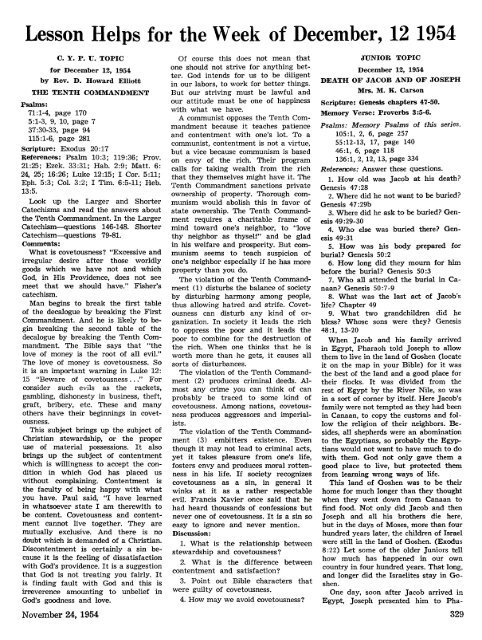Covenanter Witness Vol. 53 - Rparchives.org
Covenanter Witness Vol. 53 - Rparchives.org
Covenanter Witness Vol. 53 - Rparchives.org
You also want an ePaper? Increase the reach of your titles
YUMPU automatically turns print PDFs into web optimized ePapers that Google loves.
Lesson Helps for the Week of December, 12 1954C. Y. P. U. TOPICfor December 12, 1954by Rev. D. Howard ElliottTHE TENTH COMMANDMENTPsalms:71:1-4, page 1705:1-3, 9, 10, page 737:30-33, page 94115:1-6, page 281Scripture: Exodus 20:17References: Psalm 10:3; 119:36; Prov.21:25; Ezek. 33:31; Hab. 2:9; Matt. 6:24, 25; 16:26; Luke 12:15; I Cor. 5:11;Eph. 5:3; Col. 3:2; I Tim. 6:5-11; Heb.13:5.Look up the Larger and ShorterCatechisms and read the answers aboutthe Tenth Commandment. In the LargerCatechism questions 146-148. ShorterCatechism questions 79-81.Comments:What is covetousness? "Excessive andirregular desire after those worldlygoods which we have not and whichGod,in His Providence, does not seemeet that we should have." Fisher'scatechism.Man begins to break the first tableof the decalogue by breaking the FirstCommandment. And he is likely to begin breaking the second table of thedecalogue by breaking the Tenth Commandment. The Bible says that "thelove of money is the root of all evil."The love of money is covetousness. Soit is an important warning in Luke 12:15 "Beware of covetousness . . Forconsider such evils as the rackets,gambling, dishonesty in business, theft,graft, bribery, etc. These and manyothers have their beginnings in covetousness.This subject brings up the subject ofChristian stewardship,or the properuse of material possessions. It alsobrings up the subject of contentmentwhich is willingness to accept the condition in which God has placed uswithout complaining. Contentment isthe faculty of being happy with whatyou have. Paul said, "I have learnedin whatsoever state I am therewith tobe content. Covetousness and contentment cannot live together. They aremutually exclusive. And there is nodoubt which is demanded of a Christian.Discontentment is certainly a sin because it is the feeling of dissatisfactionwith God's providence. It is a suggestionthat God is not treating you fairly. Itis finding fault with God and this isirreverence amounting to unbelief inGod's goodness and love.November 24, 1954Of course this does not mean thatone should not strive for anything better. God intends for us to be diligentin our labors, to work for better things.But our strivingmust be lawful andour attitude must be one of happinesswith what we have.A communist opposes the Tenth Commandment because it teaches patienceand contentment with one's lot. To acommunist, contentment is not a virtue,but a vice because communism is basedon envy of the rich. Their programcalls for taking wealth from the richthat they themselves might have it. TheTenth Commandment sanctions privateownershipof property. Thorough communism would abolish this in favor ofstate ownership. The Tenth Commandment requires a charitable frame ofmind toward one's neighbor, to "lovethy neighbor as thyself" and be gladin his welfare and prosperity. But communism seems to teach suspicion ofone's neighbor especially if he has moreproperty than you do.The violation of the Tenth Commandment (1) disturbs the balance of societyby disturbing harmony among people,thus allowing hatred and strife. Covetousnesscan disturb any kind of <strong>org</strong>anization. In society it leads the richto oppress the poor and it leads thepoor to combine for the destruction ofthe rich. When one thinks that he isworth more than he gets, it causes allsorts of disturbances.The violation of the Tenth Commandment (2) produces criminal deeds. Almost any crime you can think of canprobably be traced to somekind ofcovetousness. Among nations, covetousness produces aggressors and imperialists.The violation of the Tenth Commandment (3) embitters existence. Eventhough it may not lead to criminal acts,yet it takes pleasure from one's life,fosters envy and produces moral rottenness in his life. If society recognizescovetousness as a sin, in general itwinks at it as a rather respectableevil. Francis Xavier once said that hehad heard thousands of confessions butnever one of covetousness. It is a sin soeasy to ignore and never mention.Discussion:1. What is the relationship betweenstewardshipand covetousness?2. What is the difference betweencontentment and satisfaction?3. Point out Bible characters thatwere guilty of covetousness.4. How may we avoid covetousness?JUNIOR TOPICDecember 12, 1954DEATH OF JACOB AND OF JOSEPHMrs. M. K. CarsonScripture: Genesis chapters 47-50.Memory Verse: Proverbs 3:5-6.Psalms: Memory Psalms of this series.105:1, 2, 6, page 25755:12-13, 17, page 14046:1, 6,page 118136:1, 2, 12, 13, page 334References: Answer these questions.1. How old was Jacob at his death?Genesis 47:282. Where did he not want to be buried?Genesis 47:29b3. Where did he ask to be buried? Genesis 49:29-304. Who else was buried there? Genesis 49:315. How was his .preparedbody forburial? Genesis 50:26. How long did theymourn for himbefore the burial? Genesis 50:37. Who all attended the burial in Canaan? Genesis 50:7-98. What was the last act of Jacob'slife? Chapter 499. What two grandchildren did hebless? Whose sons were they? Genesis48:1, 13-20When Jacob and his family arrivedin Egypt, Pharaoh told Joseph to allowthem to live in the land of Goshen (locateit on the map in your Bible) for it wasthe best of the land and a good place fortheir flocks. It was divided from therest of Egypt by the River Nile, so wasin a sort of corner by itself. Here Jacob'sfamily were not tempted as they had beenin Canaan, to copy the customs and follow the religion of their neighbors. Besides, all shepherds were an abominationto the Egyptians, so probably the Egyptians would not want to have much to dowith them. God not onlygave them agood place to live, but protected themfrom learning wrong ways of life.This land of Goshen was to be theirhome for much longer than they thoughtwhen theywent down from Canaan tofind food. Not only did Jacob and thenJoseph and all his brothers die here,but in the days of Moses, more than fourhundred years later, the children of Israelwere still in the land of Goshen. (Exodus8:22) Let some of the older Juniors tellhow much has happened in our owncountry in four hundred years. That long,and longer did the Israelites stay in Goshen.One day, soon after Jacob arrived inEgypt, Joseph presented him to Pha-329
















